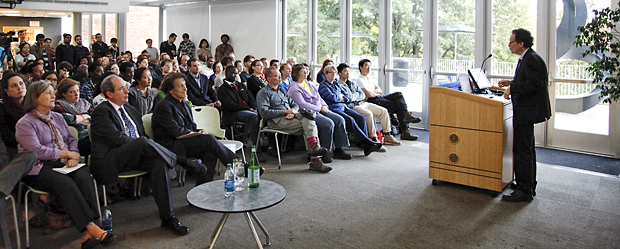The generation that eradicates poverty
Philosopher urges Heller students not to give up on human rights
 Photo/Mike Lovett
Photo/Mike LovettThomas Pogge addresses packed crowd at The Heller School
Poverty is simpler to stamp out than you may think, Yale philosopher Thomas Pogge told a packed Zinner Forum at the Heller School for Social Policy and Management Tuesday night.
Responsible for one third of all human deaths and an estimated 300 million people since the end of the Cold War, poverty is an enormous human problem. But economically, the problem is relatively small.
“To eradicate poverty at the economic level would require a shift in global household income distribution of one to two percent,” Pogge said. “That would end the severest poverty. We can be the generation that eradicates poverty.”
The 90-minute lecture was the first in a new series about social justice and human rights sponsored by the Heller School and numerous programs and departments, including the philosophy department and the Center for Ethics, Justice and Public Life.
Pogge, director of the Global Justice Program at Yale, has written extensively about human rights and poverty. At Tuesday’s event, he discussed how the world’s richest people and countries exploit and “systematically disadvantage” the world’s poorest, resulting in an “inequality spiral.”
In the U.S., the wealthiest citizens, corporations and industries hold disproportionate power, thanks to the close relationship between money and politics, Pogge asserted. The pharmaceutical industry, for example, wields far-reaching lobbying power on Capitol Hill, influencing domestic and international politics, he said.
The richest one hundredth of one percent in the U.S. — 30,000 people — have as much income as the bottom 50 percent of Americans, according to Pogge. Even more staggeringly, those 30,000 Americans have more income than the poorest 40 percent of the world’s population.
“Thirty thousand people have more income than 2.8 billion people,” Pogge said. “This tells you something about our ability to avoid poverty.”
Internationally, the richest countries are the most powerful in shaping international rules and treaties and can skew global economic policy in their favor, Pogge said, especially because treaties are hammered out behind closed doors with no democratic checks and balances.
By way of example, he noted an international law allowing any head of state to enter into negotiations to sell resources — whether or not that leader came to power legally. Imagine taking over a department store with a machine gun, Pogge said, and then selling those stolen goods to knowing customers.
“Those are rules that are convenient for us because we can buy resources from anyone in power but highly inconvenient for the people in those countries,” Pogge said. “The people in those countries not only lose the resources but the dictator uses the money earned from the sale of those resources to oppress their people.”
The rich get richer and the poor become even more oppressed, Pogge said.
But Pogge urged the students not to be overwhelmed by statistics.
“Don’t give into the small-potato argument that you can’t make a difference against this kind of power,” Pogge said. “If all the so-called small potatoes gathered on the National Mall, they could make a profound difference. Don’t give up on the work you need to do.”
Categories: Humanities and Social Sciences





